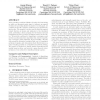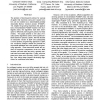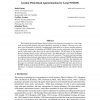260 search results - page 28 / 52 » Quasi-Deterministic Partially Observable Markov Decision Pro... |
SIGECOM
2009
ACM
14 years 2 months ago
2009
ACM
Policy teaching considers a Markov Decision Process setting in which an interested party aims to influence an agent’s decisions by providing limited incentives. In this paper, ...
IJCAI
2003
13 years 9 months ago
2003
The problem of deriving joint policies for a group of agents that maximize some joint reward function can be modeled as a decentralized partially observable Markov decision proces...
JAIR
2006
13 years 7 months ago
2006
The Partially Observable Markov Decision Process has long been recognized as a rich framework for real-world planning and control problems, especially in robotics. However exact s...
CSL
2012
Springer
12 years 3 months ago
2012
Springer
Reinforcement techniques have been successfully used to maximise the expected cumulative reward of statistical dialogue systems. Typically, reinforcement learning is used to estim...
ATAL
2009
Springer
14 years 2 months ago
2009
Springer
Reinforcement learning algorithms that use eligibility traces, such as Sarsa(λ), have been empirically shown to be effective in learning good estimated-state-based policies in pa...



